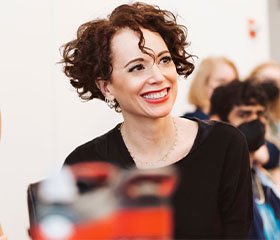Pre-opening discussion of Sarah Ruhl’s Becky Nurse of Salem has tended to focus on magic and witchcraft and Arthur Miller’ 1953 drama, The Crucible. But when I spoke recently with Rebecca Taichman, the director of LCT’s Becky Nurse production, in the Mitzi E. Newhouse, our emphasis was elsewhere. As Taichman put it, “Yes, the Salem witch trials are a key part of the story, but at the very heart of it is a 62-year-old woman living in 2016 Salem, struggling to care for her family and for herself.”
Becky’s daughter has died and her granddaughter, Gail, has just gotten out of the hospital. Becky has lost her job at a Salem’s witchcraft museum, and when she consults the Classifieds she discovers that in all of Salem there are only two available jobs: one as a nurse, for which she is unqualified, and the other as a night clerk at the Marriott, a position that has already been filled by the teenage boy who, to Becky’s dismay, has started seeing her granddaughter.
“Becky is in crisis,” Taichman told me. “At the beginning of the play, she loses her job, and there’s no work in Salem. She loses her health insurance. She’s alone. And yet she’s hilarious and full of insight and wisdom. She’s a fighter. And she decides to see a witch in a desperate attempt to solve the seemingly impossible.”
Becky is a survivor, and, Taichman said, it was crucial to find an interpreter for the role who could convey both the character’s fierceness and her vulnerability. “We are very lucky to have Didi,” Taichman said, referring to the nickname for Deirdre O’Connell, who plays Rebecca and who earlier this year won a Tony Award for her performance in Dana H. Taichman added: “Didi is a singular force. Sarah’s writing is at once deeply human and uniquely theatrical. Didi knows just how to walk that line. She’s a master.”
According to Taichman, who has directed two previous Ruhl plays at the Newhouse, Becky Nurse shows to advantage one of Ruhl’s signature talents: to embed big ideas in intimate stories. “Sarah’s work,” the director said, “straddles the epic and mythic on the one hand and the profoundly personal on the other.”
Taichman and I did eventually get round to the subject of witches. “As research,” she explained, “I spoke to someone who practices witchcraft. An amazing person. She explained to me that it’s dangerous to mess with witchcraft if your intention is not pure. If your intention or your purpose is unprocessed, or in any way malevolent, it will backfire ten-fold.”
How does one depict magic on stage? “It depends on the story,” Taichman replied. “Harry Potter, for example, is all ABOUT actual magic. Becky Nurse invites us to ask: is what’s happening magic, or is it the invitation to courage that a belief in magic can give?” Taichman added: “Early in tech, we realized that if we defined the magic as definite magic, that ambiguity was erased.”
This philosophy is in keeping with a central truth Taichman said she has learned in her 20 years as a director, a career in which she has staged several acclaimed evenings and won a Tony award, in 2017, for her production of Paula Vogel’s Indecent. Taichman said: “I am a visual thinker, and I believe visual storytelling is essential.” She added: “When you have thrilling actors, as we do with Becky Nurse, I am reminded to trust the simplest, most organic truth. My job is to release the story to an audience in the most powerful, honest way I can find.”
Brendan Lemon is the editor of lemonwade.com
